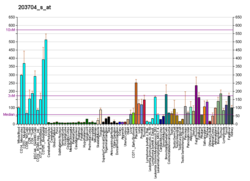RREB1
Appearance
(Redirected from RREB1 (gene))
Ras-responsive element-binding protein 1 is a protein that in humans is encoded by the RREB1 gene.[5][6][7]
Clinical significance
[edit]Mutations in RREB1 are associated to type 2 diabetes associated end-stage kidney disease.[8]
References
[edit]- ^ a b c GRCh38: Ensembl release 89: ENSG00000124782 – Ensembl, May 2017
- ^ a b c GRCm38: Ensembl release 89: ENSMUSG00000039087 – Ensembl, May 2017
- ^ "Human PubMed Reference:". National Center for Biotechnology Information, U.S. National Library of Medicine.
- ^ "Mouse PubMed Reference:". National Center for Biotechnology Information, U.S. National Library of Medicine.
- ^ Thiagalingam A, Lengauer C, Baylin SB, Nelkin BD (Jan 1998). "RREB1, a ras responsive element binding protein, maps to human chromosome 6p25". Genomics. 45 (3): 630–632. doi:10.1006/geno.1997.5001. PMID 9367691.
- ^ Melani M, Simpson KJ, Brugge JS, Montell D (Apr 2008). "Regulation of cell adhesion and collective cell migration by hindsight and its human homolog RREB1". Curr Biol. 18 (7): 532–537. Bibcode:2008CBio...18..532M. doi:10.1016/j.cub.2008.03.024. PMID 18394891. S2CID 17251337.
- ^ "Entrez Gene: RREB1 ras responsive element binding protein 1".
- ^ Bonomo JA, Guan M, Ng MC, Palmer ND, Hicks PJ, Keaton JM, Lea JP, Langefeld CD, Freedman BI, Bowden DW (2014). "The ras responsive transcription factor RREB1 is a novel candidate gene for type 2 diabetes associated end-stage kidney disease". Human Molecular Genetics. 23 (24): 6441–7. doi:10.1093/hmg/ddu362. PMC 4240197. PMID 25027322.
Further reading
[edit]- Thiagalingam A, De Bustros A, Borges M, Jasti R, Compton D, Diamond L, Mabry M, Ball DW, Baylin SB (1996). "RREB-1, a novel zinc finger protein, is involved in the differentiation response to Ras in human medullary thyroid carcinomas". Mol. Cell. Biol. 16 (10): 5335–45. doi:10.1128/mcb.16.10.5335. PMC 231532. PMID 8816445.
- Fujimoto-Nishiyama A, Ishii S, Matsuda S, Inoue JI, Yamamoto T (1997). "A novel zinc finger protein, Finb, is a transcriptional activator and localized in nuclear bodies". Gene. 195 (2): 267–275. doi:10.1016/S0378-1119(97)00172-8. PMID 9305772.
- Zhang L, Zhao J, Edenberg HJ (1999). "A human Raf-responsive zinc-finger protein that binds to divergent sequences". Nucleic Acids Res. 27 (14): 2947–2956. doi:10.1093/nar/27.14.2947. PMC 148511. PMID 10390538.
- Strausberg RL, Feingold EA, Grouse LH, Derge JG, Klausner RD, Collins FS, Wagner L, Shenmen CM, Schuler GD (2003). "Generation and initial analysis of more than 15,000 full-length human and mouse cDNA sequences". Proc. Natl. Acad. Sci. U.S.A. 99 (26): 16899–16903. Bibcode:2002PNAS...9916899M. doi:10.1073/pnas.242603899. PMC 139241. PMID 12477932.
- Ray SK, Nishitani J, Petry MW, Fessing MY, Leiter AB (2003). "Novel transcriptional potentiation of BETA2/NeuroD on the secretin gene promoter by the DNA-binding protein Finb/RREB-1". Mol. Cell. Biol. 23 (1): 259–271. doi:10.1128/MCB.23.1.259-271.2003. PMC 140679. PMID 12482979.
- Zhang S, Qian X, Redman C, Bliskovski V, Ramsay ES, Lowy DR, Mock BA (2003). "p16 INK4a gene promoter variation and differential binding of a repressor, the ras-responsive zinc-finger transcription factor, RREB". Oncogene. 22 (15): 2285–2295. doi:10.1038/sj.onc.1206257. PMID 12700664. S2CID 917155.
- Shi Y, Sawada J, Sui G, Affar EB, Whetstine JR, Lan F, Ogawa H, Po-Shan Luke M, Nakatani Y (2003). "Coordinated histone modifications mediated by a CtBP co-repressor complex". Nature. 422 (6933): 735–738. Bibcode:2003Natur.422..735S. doi:10.1038/nature01550. PMID 12700765. S2CID 2670859.
- Ota T, Suzuki Y, Nishikawa T, Otsuki T, Sugiyama T, Irie R, Wakamatsu A, Hayashi K, Sato H (2004). "Complete sequencing and characterization of 21,243 full-length human cDNAs". Nat. Genet. 36 (1): 40–45. doi:10.1038/ng1285. PMID 14702039.
- Date S, Nibu Y, Yanai K, Hirata J, Yagami K, Fukamizu A (2005). "Finb, a multiple zinc finger protein, represses transcription of the human angiotensinogen gene". Int. J. Mol. Med. 13 (5): 637–42. doi:10.3892/ijmm.13.5.637. PMID 15067362.
- Beausoleil SA, Jedrychowski M, Schwartz D, Elias JE, Villén J, Li J, Cohn MA, Cantley LC, Gygi SP (2004). "Large-scale characterization of HeLa cell nuclear phosphoproteins". Proc. Natl. Acad. Sci. U.S.A. 101 (33): 12130–12135. Bibcode:2004PNAS..10112130B. doi:10.1073/pnas.0404720101. PMC 514446. PMID 15302935.







